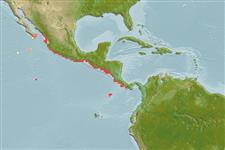>
Eupercaria/misc (Various families in series Eupercaria) >
Lutjanidae (Snappers) > Lutjaninae
Etymology: Lutjanus: Malay, ikan lutjan, name of a fish.
More on author: Peters.
Environment: milieu / climate zone / depth range / distribution range
Écologie
marin récifal; profondeur ? - 40 m (Ref. 9313). Tropical; 24°N - 4°N, 118°W - 82°W (Ref. 55)
Eastern Pacific: Mexico to Panama. Included in the genus Rabiruba Jordan & Fesler by some authors.
Taille / Poids / Âge
Maturity: Lm ? range ? - ? cm
Max length : 34.0 cm TL mâle / non sexé; (Ref. 9313)
Description synthétique
Clés d'identification | Morphologie | Morphométrie
Épines dorsales (Total) : 10; Rayons mous dorsaux (Total) : 13; Épines anales: 3; Rayons mous anaux: 11. Snout very pointed. Mouth relatively small, the maxilla extending to front of eye. Eyes large, about 4 times in head length. Preopercular notch and knob weak. Scale rows on back rising obliquely above lateral line. Live coloration unknown.
Adults inhabit coastal rocky and coral reefs up to at least 40 m depth (Ref. 9313). During the day they form schools of 30 or more individuals, which sometimes remain stationary (Ref. 9313). Juveniles are seen associated with schools of Chromis atrilobata (Ref. 9313). Feed on invertebrates and fish and may also ingest plankton (Ref.9313). Marketed fresh and frozen (Ref. 9313).
Life cycle and mating behavior
Maturité | Reproduction | Frai | Œufs | Fécondité | Larves
Allen, G.R., 1985. FAO Species Catalogue. Vol. 6. Snappers of the world. An annotated and illustrated catalogue of lutjanid species known to date. FAO Fish. Synop. 125(6):208 p. Rome: FAO. (Ref. 55)
Statut dans la liste rouge de l'IUCN (Ref. 130435: Version 2024-2)
Menace pour l'homme
Harmless
Utilisations par l'homme
Pêcheries: d'intérêt potentiel; pêche sportive: oui
Outils
Articles particuliers
Télécharger en XML
Sources Internet
Estimates based on models
Preferred temperature (Ref.
123201): 25.3 - 28.7, mean 27.6 °C (based on 16 cells).
Phylogenetic diversity index (Ref.
82804): PD
50 = 0.5000 [Uniqueness, from 0.5 = low to 2.0 = high].
Bayesian length-weight: a=0.01479 (0.00706 - 0.03101), b=2.97 (2.80 - 3.14), in cm total length, based on LWR estimates for this Genus-body shape (Ref.
93245).
Niveau trophique (Ref.
69278): 3.8 ±0.57 se; based on food items.
Résilience (Ref.
120179): Haut, temps minimum de doublement de population inférieur à 15 mois (Preliminary K or Fecundity).
Fishing Vulnerability (Ref.
59153): Low vulnerability (24 of 100).
Nutrients (Ref.
124155): Calcium = 46.4 [27.5, 73.8] mg/100g; Iron = 0.414 [0.265, 0.689] mg/100g; Protein = 18.3 [16.8, 19.6] %; Omega3 = 0.131 [0.086, 0.202] g/100g; Selenium = 50 [29, 86] μg/100g; VitaminA = 243 [46, 1,007] μg/100g; Zinc = 0.47 [0.35, 0.68] mg/100g (wet weight);
